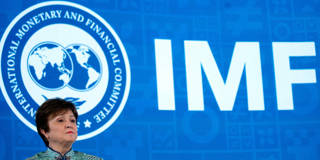Like much of the financial system, the IMF was slow to grasp that climate change could be just as “macro-critical” as, say, advanced-economy interest-rate shocks, wars, or financial crises. That is now changing, but not quickly – or radically – enough.
PARIS/BOSTON – With their agreement at COP28 to “transition away from fossil fuels in energy systems,” countries have made genuine progress on tackling climate change. But there is still much to do to mobilize the level of financing needed to turn the commitment into reality. International organizations – especially the International Monetary Fund – must step up. Though the IMF was relatively slow off the mark in the race to combat climate change, it has made great strides under Managing Director Kristalina Georgieva. But it must take its climate leadership much further.
The Independent High-Level Expert Group on Climate Finance estimates that, between now and 2030, emerging-market and developing economies will need to mobilize $2.4 trillion annually to fight climate change, with $1 trillion of that sum coming from external sources. This might seem high, but it is nothing compared to the costs of inaction.
Already, severe hurricanes and flooding in the Caribbean, drought in Sub-Saharan Africa and Argentina, and wildfires in many advanced economies are fueling instability and causing severe economic damage, including balance-of-payments crises in some countries. As climate-related disasters multiply and intensify, the costs of building resilience and moving onto a low-carbon development path will only rise, while countries’ ability to cover those costs will fall.

PARIS/BOSTON – With their agreement at COP28 to “transition away from fossil fuels in energy systems,” countries have made genuine progress on tackling climate change. But there is still much to do to mobilize the level of financing needed to turn the commitment into reality. International organizations – especially the International Monetary Fund – must step up. Though the IMF was relatively slow off the mark in the race to combat climate change, it has made great strides under Managing Director Kristalina Georgieva. But it must take its climate leadership much further.
The Independent High-Level Expert Group on Climate Finance estimates that, between now and 2030, emerging-market and developing economies will need to mobilize $2.4 trillion annually to fight climate change, with $1 trillion of that sum coming from external sources. This might seem high, but it is nothing compared to the costs of inaction.
Already, severe hurricanes and flooding in the Caribbean, drought in Sub-Saharan Africa and Argentina, and wildfires in many advanced economies are fueling instability and causing severe economic damage, including balance-of-payments crises in some countries. As climate-related disasters multiply and intensify, the costs of building resilience and moving onto a low-carbon development path will only rise, while countries’ ability to cover those costs will fall.